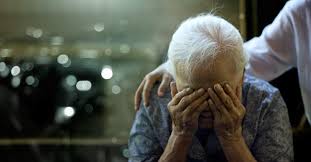
ANXIETY in elderly patients can have various causes, including:
Factors Contributing to Anxiety in Elderly Patients
- Chronic Conditions: Chronic illnesses, pain, and disabilities associated with aging can contribute to anxiety, especially if the patient fears worsening health or loss of independence.
- Medication Side Effects: Certain medications commonly prescribed to older adults can cause or exacerbate anxiety symptoms as a side effect.
- Life Transitions: Major life changes such as retirement, relocation, loss of a spouse or friends, or changes in living arrangements can trigger anxiety in older adults.
- Cognitive Decline: Cognitive impairments associated with conditions like dementia or Alzheimer's disease can lead to confusion, disorientation, and increased anxiety.
- Traumatic Experiences: Past traumatic events may resurface in old age and contribute to anxiety symptoms.
- Isolation and Loneliness: Social isolation, lack of companionship, and limited social interactions can lead to feelings of loneliness and contribute to anxiety in elderly individuals.
- Financial Concerns: Worries about financial stability, managing healthcare costs, or outliving savings can cause anxiety in older adults.
- Fear of Death: Facing one's mortality and contemplating the end of life can provoke anxiety in elderly patients.
- Sleep Disturbances: Insomnia or disrupted sleep patterns commonly experienced in old age can exacerbate anxiety symptoms.
- Changes in Independence: Loss of mobility, decreased ability to perform daily activities independently, or reliance on others for care can lead to feelings of helplessness and anxiety in elderly individuals.
Strategies for Treating Anxiety in Elderly Patients
- Medical Evaluation: Ensure the patient receives a thorough medical evaluation to rule out any underlying medical conditions or medication side effects that could be contributing to their anxiety.
- Medication:In some cases, medications such as anti-anxiety drugs or antidepressants may be prescribed to help alleviate symptoms. However, caution should be exercised due to potential side effects and interactions with other medications.
- Therapy: Cognitive-behavioral therapy (CBT) or other forms of psychotherapy can be effective in helping elderly patients learn coping strategies, challenge negative thought patterns, and reduce anxiety symptoms.
- Relaxation Techniques: Encourage the use of relaxation techniques such as deep breathing exercises, progressive muscle relaxation, or mindfulness meditation to help calm the mind and body.
- Physical Activity: Regular physical activity has been shown to reduce anxiety and improve mood in elderly individuals. Encourage activities such as walking, swimming, or gentle yoga, tailored to the patient's abilities.
- Social Support: Encourage the patient to maintain social connections and engage in activities they enjoy with friends and family members. Social support can help reduce feelings of loneliness and anxiety.
- Healthy Lifestyle: Promote a healthy lifestyle that includes balanced nutrition, adequate sleep, and limiting caffeine and alcohol intake, as these factors can contribute to anxiety symptoms.
- Routine and Structure: Establishing a predictable daily routine can provide a sense of stability and security for elderly patients, which may help reduce anxiety.
- Addressing Environmental Stressors: Identify and address any environmental stressors or triggers that may be contributing to the patient's anxiety, such as excessive noise, clutter, or changes in living arrangements.
- Regular Monitoring and Follow-up: Monitor the patient's symptoms closely and adjust treatment strategies as needed. Regular follow-up appointments with healthcare providers can help ensure that the patient's anxiety is effectively managed over time.
Dr. Ramesh R. Khandare (M.S General Surgery)

